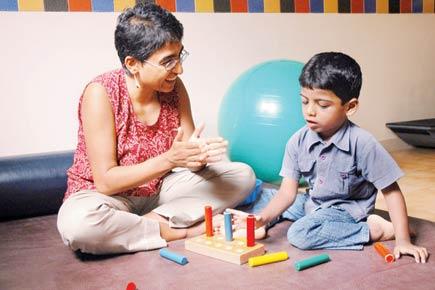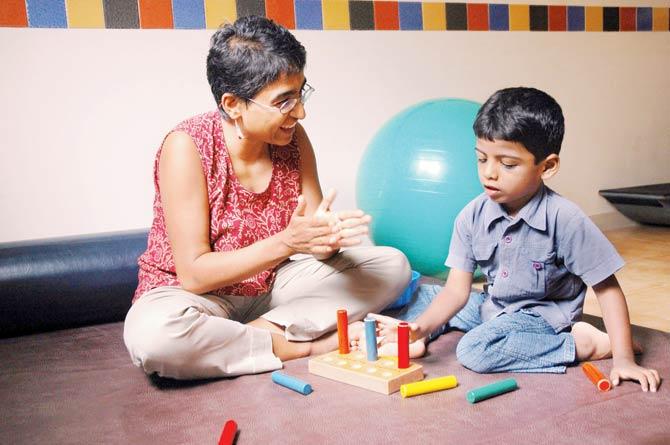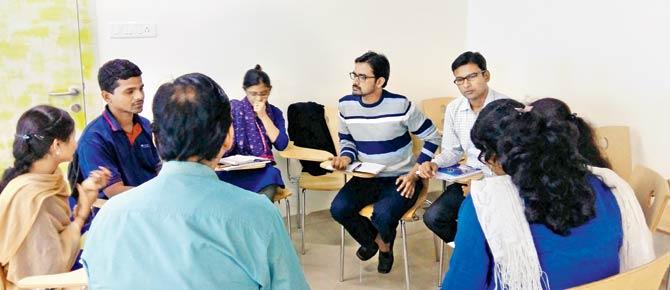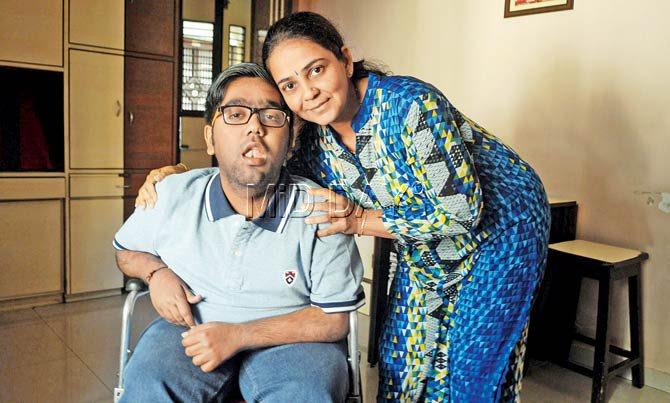With a syllabus that’s two decades behind the West, doctors in India are still not trained in spotting developmental disabilities. The Ummeed centre in Parel, among two in the city, will fill this gap


Founder and medical director of Ummeed Child Development Centre Dr Vibha Krishnamurthy during a workshop
One evening on a weekday, when we manage to catch 16-year-old Sanket for a phone chat, he is engrossed in his favourite TV show. His mother, Sheetal Umesh Gala, has stepped out to buy groceries and won’t return before 8 pm, he says. Incidentally, this is the only time of the day when Sheetal lets her son be. On other occasions, she is busy accompanying the teenager everywhere, including his college, where she waits outside the classroom till he gets done with his lectures. “Just in case he needs help in the washroom,” she later tells us.
ADVERTISEMENT

Health professionals during a workshop held for them by Ummeed
Sanket suffers from muscular dystrophy, a degenerative disease, which results in increasing weakening and breakdown of skeletal muscles over time. While Sanket is wheelchair-bound, both he and Sheetal are aware that his condition won’t improve. But timely diagnosis and early intervention, including physiotherapy and counselling, has ensured that Sanket, who scored an 89.8 per cent in his SSC last year and later secured admission at Matunga’s Ruia College, lives in inclusion.

Sanket Gala with his mother Sheetal at their home in Lalbaug. Pic/Datta Kumbhar
Not all are as lucky. Case in point a girl his age who suffers from the same condition. “She left school after Std IX and is now bed-ridden. She finds it difficult to even sit for 30 minutes,” Sheetal says.
Grave and growing menace
For any parent, having a label for their child is always difficult to accept, says Parul Kumtha, founding trustee and president of Forum for Autism — an informal support group started over 20 years ago — and mother of a 24-year-old with autism.
Dr Paresh Desai, a paediatrician attached with Bhatia and Saifee hospitals, also points to how the stigma associated with developmental disabilities prevents many parents from taking action early on. “Many parents live in denial. If you bring your child to me, and I tell you that your child has a developmental disability, you will change your doctor right away,” he says from his own experience.
But the problem is too grave to be ignored. As per the World Health Organization, one in 10 people suffer from developmental disabilities across the globe. As per 2011 Census of India, there are 7,862,921 children with disability below the 19 year age group, among which 595,089 have intellectual disability. “Of the 100 children I see daily, at least four have problems,” says Dr Desai.
Similarly, one in 68 people are said to suffer from autism. “If you do the math, in a population of 1.2 billion people in India, you will have close to 14 million people with autism. That’s nearly the population of Mumbai,” adds Kumtha.
At times, too late
Truth is, in India, no two similar cases of developmental and behavioural disabilities in children are ever likely to achieve the same, desired result. The reason: paediatricians are not equipped with the right kind of training to diagnose developmental disorders like autism, learning disabilities, and attention deficit hyperactivity disorder among others. The result: due to incorrect or no diagnosis at all, often precious early intervention time is lost, impairing the building blocks in children.
Having realised the lacunae in the syllabus of medical schools, child development centres, such as Ummeed and New Horizons in Mumbai, have been extending training to paediatricians, parents and community workers, who have direct access to children.
Only early this week, Ummeed launched a full-fledged training centre in Parel that will provide specialised courses and training resources to paediatricians among others to achieve this goal.
'Lopsided med education'
“Till about recently, the fact that developmental disabilities existed in such a significant manner in our children had been completely ignored,” says Dr Koyeli Sengupta, developmental paediatrician and director (autism intervention services) at Ummeed.
Dr Desai recalls how when he graduated from medical school nearly three decades ago, he knew nothing about the autistic spectrum.
“It was like a black hole; you know there is one in space, but you know nothing about it,” he says, blaming it on India’s medical education system, which, he adds, is lopsided in its focus.
Dr Raju Khubchandani, director (paediatrics), Jaslok Hospital and in-charge of the Paediatric Rheumatology Clinic, agrees. “If you read the syllabus, there is a mention of developmental paediatrics. But when it comes to day-to-day exposure, teaching and experience, the focus is largely towards infectious diseases and acute care. Medical schools will teach you how to treat pneumonia, convulsions etc. But you aren’t imparted sufficient training to treat kids born with a developmental disability,” he says.
We are actually 20 years behind the West when it comes to this area of study, says Dr Samir Dalwai, developmental paediatrician at New Horizons. “Though the curriculum does not focus on the problem, paediatricians should be willing to learn and make that extra effort. It is important to become aware and be equipped with tools and tests to diagnose developmental disorders quickly for the benefit of the child,” says Dr Desai, who has been associated with Ummeed ever since it was launched in 2001.
Don’t lose out on time
According to Jehanzeb Baldiwala, training head and director (mental health services) at Ummeed, it’s important that paediatricians are made aware of developmental disabilities, even if it’s not their field of specialisation.
“The earlier one can work with children, the better is their ability to cope with the problem. The brain develops very rapidly between 0 and three years. And, in this time period, outside of the family circle, a kid’s contact is mostly with his/her paediatrician. So, for the doctor to diagnose the problem early on becomes extremely crucial,” says Baldiwala.
Saying that early diagnosis and intervention, helped her son “live with inclusion”, Kumtha explains, “If a child does not bridge the gap in learning in the early years, it can affect further learning and becomes a cumulative problem. The earlier the gaps are bridged, the better the prognosis into adulthood. My son has been working in a sheltered workshop for special adults for the last six years. He is able to do so because he was lucky to have appropriate intervention at an early age.”
Getting rid of the stigma
Usha Ganguly (name changed), mother of a 13-year-old with Asperger’s — the upper end of the autism spectrum — recalls how she had to not only fight family, but also her child’s paediatrician when she first realised that her kid, then two years old, had a problem.
“At some level, I don’t blame them (paediatricians) because they have to deal with a lot of hyper mothers every day and aren’t armed with the necessary developmental cues. But to undermine a mother’s instinct and intelligence might have a long-lasting impact on the child,” she says.
“At the age of two, my child had a fantastic memory. He could identify the flags from over 60 countries, but he couldn’t create a simple sentence,” Ganguly recalls, adding, “I knew something was wrong.
“I was blessed that the paediatrician that we finally did go to, managed to diagnose his problem after noticing his obsession with fans.”
At Ummeed today, Ganguly’s son is described as a “miracle child”. “At the age of two, he had no speech at all. With a lot of intervention and medication at the right time, he has come a long way,” she adds.
The way forward
Last year, Dr Dalwai, who is also the national president of the chapter of neuro-developmental paediatrics, Indian Academy of Paediatrics (IAP) along with other doctors launched a national fellowship for doctors keen on training in developmental-behavioural paediatrics after completing medical school. The fellowship is being offered at both Ummeed and New Horizons.
When contacted, Dr Kalidas Chavan, registrar of Maharashtra University of Health Sciences, chose against discussing the lack of focus on this area of paediatrics in the medical school syllabus. “The medical council has approved the fellowship programme. It will help doctors greatly,” he says.
Even among paediatricians, the awareness about the problem is greatly improving, says Dr Dalwai. “We hold regular training programmes, workshops and conferences for paediatricians on this subject. In 2009, when we conducted our first conference, hardly 200 paediatricians from all over the country attended. In 2016, 800 participated. So somewhere, I feel, the IAP chapter has managed to create awareness about the issue,” he adds.
According to Dr Dalwai, the need of the hour is, however, to move away from arbitrary therapies for children with these disorders. “We need a more time-bound and goal-oriented plan in place.”
For now, though paediatricians are far from achieving the desired result, it appears that they are taking a step in the right direction. Dr Khubchandani says, “Twenty years ago, we didn’t even know there was an iceberg. Today, the tip is visible. And places like Ummeed have touched that tip. You need a thousand more for this country.”
 Subscribe today by clicking the link and stay updated with the latest news!" Click here!
Subscribe today by clicking the link and stay updated with the latest news!" Click here!







